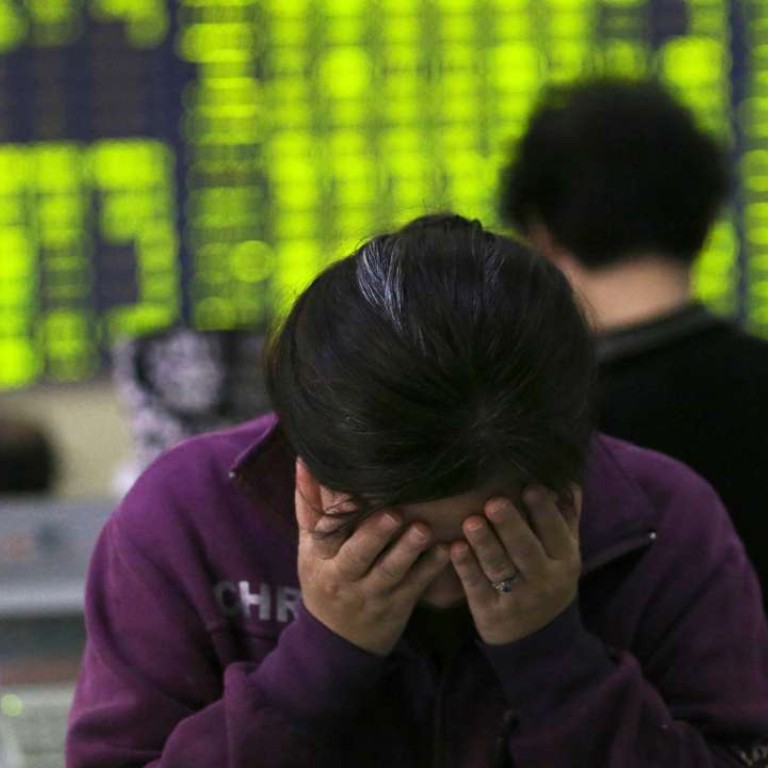
Bond funds provide scant relief for mainland investors who fled 2015 stock rout
About a third of mainland bond funds managed by fund houses have posted losses so far this year, according to Wind Information
Mainland investors who sought safety in bond funds after they were burned in the stock market crash of mid-2015 may find themselves licking their wounds once more.
As of Monday 450 bond funds – about a third of the 1,400 mutual funds focusing on fixed-interest investment – had posted losses this year, according to Shanghai-based data provider Wind Information.
The woeful performance of the funds – known normally as an investment product that generates low but stable returns – came after a frenzied buying spree last year.
The total value of bond funds under the management of the 113 mainland mutual fund houses climbed 760 billion yuan (US$110.4 billion) to 9.1 trillion yuan in 2016.
I tried to dodge volatility on the stock market, only to find volatility spread to the bond market
Their sudden popularity reflected a weaker risk appetite among investors after the key stock index slumped 43.3 per cent in less than three months from June 12, 2015 – a market rout that wiped out capitalisation of US$5 trillion.
“I tried to dodge volatility on the stock market, only to find volatility spread to the bond market,” said Yu Haipeng, a Shanghai-based retail investor who bought 300,000 yuan worth of bond funds last year. “Retail investors are always jinxed.”
In the fourth quarter of last year, a sell-off in mainland bonds was sparked by worries about an interest rate increase by the US Federal Reserve and the Chinese central bank’s moves to withdraw liquidity from the money market.
Bondholders who feared the threat of an interest rate rise and liquidity drain dumped their bonds – which carry fixed interest rates – to withdraw cash, while buying newly issued debt whose yields were higher as a result of the increase in borrowing costs.
A price drop would cause losses for the bond funds.
Bond funds not only allocate the cash raised from investors to buy debt securities ranging from government treasury bills to corporate debt, but also buy bonds using leverage via the repo market.
Under a repo agreement, bondholders agree with an investor to “sell” the bonds to the “buyer” with a view to buying them back on a fixed date and at a pre-agreed price. In effect, it is a short-term loan deal in which the bonds are used as collateral by the funds to borrow cash from other institutions.
Bond funds are not necessarily safe bets. It is another hard lesson for small investors to learn
Since the current leadership took office in 2012, Beijing has been making stringent efforts to deleverage an economy facing financial risks.
As the central government continues to reduce excessive stockpiles and cut industrial overcapacity to pursue slow but sustainable growth, the money market is unlikely to see enough liquidity to lower interest rates and hence drive up bond prices.
“Looking ahead, increased liquidity volatility combined with regulatory tightening may cause some unintended consequences, including possible liquidity or credit events, followed by sudden deleveraging in the interbank market,” said UBS economist Wang Tao. “We expect money market rates and bond yields to be volatile and elevated this year.”
Wind Information said 76 bond funds had lost more than 1 per cent of their value so far this year. They were outperformed by money market funds which technically generate returns at a lower rate.
Money market funds, regarded as being as safe as bank deposits, normally invest in short-term debt securities.
We expect money market rates and bond yields to be volatile and elevated this year
As of Monday, the mainland’s money market funds had reported an average gain of 0.71 per cent in net asset value this year, compared to 0.19 per cent by bond funds in the same period, Wind said.
The China Securities Regulatory Commission (CSRC) has been encouraging retail investors to buy shares of mutual funds in an effort to avoid irrational speculation in the volatile A-share market.
More than 100 million individual investors are estimated to be betting on price swings in the market, hoping to get rich quickly. Such speculators tend to base their investment decisions on rumours rather than a sound assessment of the fundamentals.
The regulator believed that institutions such as mutual funds could bring some much-needed calm to the volatile market.
However, the asset managers have for the most part failed to live up to that expectation.
In early March, the South China Morning Post found that 40 guaranteed funds – mutual funds that at least guarantee the repayment of principal – had posted investment losses, and net asset values that fell below the offering price of 1 yuan per share.
When the net asset value crashes below the offering price, the fund manager is not able to fully repay investors the principal.
The CSRC has published draft rules governing guaranteed funds, which bar mutual fund companies from launching investment products of that kind.
“Bond funds are not necessarily safe bets,” said Gu Weiyong, chief executive of hedge fund company Shanghai Ucon Investment. “It is another hard lesson for small investors to learn.”

